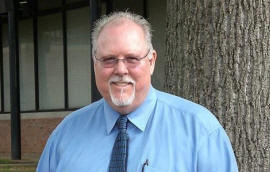|
 The
bond of the American Veteran memory The
bond of the American Veteran memory
By Jim Killebrew
 Send a link to a friend
Send a link to a friend
[November 11, 2014]
After
having watched a movie like the recently released "Fury" starring
Brad Pitt, one gets a sense of the indescribable hardships
experienced in the military during wars. That one was set in the
context of WWII in Germany during a war that was beginning to wind
down, but still facing an enemy that was looking toward a hopeless
future where people would be starting out life again, but with
nothing. The enemy was refusing to give up even in the face of
certain loss. The sights, sounds, and experiences of war depicted in
a carefully scripted movie provides a window into the horror of war
from a vicarious perspective. But the real thing being experienced
by those who are actually there, present with the carnage, seeing
the death, living the frustrations, losing friends and managing the
set-backs is a hundred times more imprinted into the brain than it
is for those who simply watch a movie. |
 Having served in the military in any of the branches, or
experiencing the life of a military person, whether on foreign
fields or domestic assignments, the veteran has obtained a memory of
those experiences and a relationship with comrades that runs deeper
than normally forged friendships. That relationship is built on
shared experiences and common memories. The intensity of those
experiences sometimes result in a common knowledge of "knowing" the
realities, but forcing the subconscious to repress those memories
into silence. That can be seen by the number of Post-Traumatic
Stress Disorder (PTSD) cases among those veterans leaving the active
duty.
Many families have experienced their loved one who has returned from
a hazardous military assignment being reticent about their
experiences "in country" or from special assignments. When trying to
get the veteran to "open up" with information about his/her
experiences they are reluctant to do so, and the questioner's
response is met with silence, withdrawal, fear, and sometimes anger.
In such times the veteran might have a flashback memory of the time
his best buddy bled out in the veteran's arms, or the firefight they
experienced that left many dead or wounded.

When a person decides to be part of the military in our modern times
and reaches the inductee station to raise his or her hand to take
the oath to protect the United States of America, that person begins
the journey down the road of learning just what others before him
experienced. Beginning with the rigorous training of Basic, to the
highly technical schools where the most advanced weapons of war are
taught and the skills of that training become the very DNA of that
recruit. That person begins to turn into a highly-tuned,
combat-ready bundle of "Esprit-de-Corps" that joins him/her into a
group spirit that is not likely separated, even in the most
difficult circumstances. That is the reason the military has
developed practices of "no man left behind" and will move some to
even give their own lives to save their "Brother-in-arms."
[to top of second column] |

Those Brothers-in-arms begin to move as a unit together to achieve the
purposes established by the higher command that include protection of a
nation from harm and the continuation of the freedoms earned from past
Brothers by the shedding of their blood. They have learned about honor
and tradition; not just the words but the life-style of being there when
needed and ready for the call. They are the ones who storm the beaches,
fight in the jungles, stand on the line and keep the enemy at arm's
length. They protect our shores, our resources and way of life; they are
freedom-fighters that are always standing ready to turn back the enemy
that seeks to destroy our way of life.
So this Veteran's Day sit down and think about all the American veteran
has had to do to ensure the freedoms we enjoy. Think of those who are
serving now, and those who have served anytime throughout their lives.
Try to put yourself in their shoes and think about the experiences they
have endured. Bow you head and say a little prayer for each of the
veterans you know in your life. And if you are around a veteran who has
been separated by enough time from his or her experiences and the
present time, and is willing to share some experiences with you, let
them do it. For sure, you will be hearing a history and recording a
memory that is first hand, and deeply rooted in the American fabric. You
will be much richer for the experience.
[By JIM KILLEBREW]
Click here to respond to the editor about this
article.

|